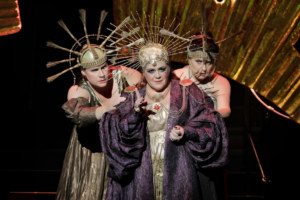
Great & Not So Great Parents From Opera
By John VandevertPhoto Credit: Cory Weaver
Opera is full of parents that have difficult, often downright hostile, relationships with their children.
Sometimes they are married off to unloving partners and treated like slaves or vermin. Other times, they are all together abandoned. But, while there are a lot of uncaring parents, there are many parents who love their children and who go to great lengths to protect them and show their undying love. Some of the most popular “bad moms” are The Queen of the Night in “The Magic Flute,” and Klytaemnestra in “Elektra.” There are also “bad fathers” like Wotan in “The Ring Cycle” and the entire Borgias family in “Lucrezia Borgia,” not far behind. Heck, the difficulties of motherhood and being a wife have even been made into an opera, “Mother“ (1929).
Despite all their flaws, mothers and fathers in opera are as human as we are, even the gods. But, that doesn’t mean their actions are justified. Much like the infamous stories of Margaret Garner and Iphigenia, there’s never one side to the story. Fathers like Pinkerton in “Madame Butterfly,” make unwise choices. But, are often victim to ignorance.
In honor of Parents Day this year, let’s take a look at some great and not so great parents across the operatic spectrum. From the Italian 19th-century all the way to the Icelandic 21st-century, parents have shaped opera!
Alfredo’s Father, “La Traviata”
As the story goes, Alfredo fell in love with a courtesan named Violetta. However, given the controversial nature of her work, and seeing as Alfredo is from a bourgeois family, this relationship couldn’t last. Thus, in efforts to kill the relationship, Giorgio Germont (father) goes to see Violetta to strongly advise her to stop communing with his son in the heartbreaking ode, “Pura siccome un angelo.” Impressed by Violetta’s noble etiquette, he nevertheless pleads with her to refrain and she inevitably gives in. Little does he know that she’ll die very soon, with Alfredo having to live with the experience of her death.
Mrs. Herring, “Albert Herring”
This is an opera based on the complex relationship between morality, juvenile purity, and social belonging. Britten’s opera deals with the theme of mother and son in a rather realistic light. Albert has no relationship and lives according to the rules of his mother, Mrs. Herring. He longs to be free and to live in his own way. But, is continuously captured by his mother and her desires. The pronouncement of him being May King at a local festival, ignites a fight between them. By the end of the opera, Albert confronts his mother on her controlling behavior and, having spent a night out, becomes truly free.
Gertrud, “Hansel und Gretel”
Perhaps one of the better known villains of the opera world is the stepmother in the well-beloved story of Hansel und Gretel. She is a ferocious character. Following the death of Peter’s wife, he marries a woman who seems to hate his children and forces them to go out into the woods in hopes they’ll end up lost. The children eventually come home, after encountering a witch in the woods, and both parents embrace them. It’s unclear from the opera if the stepmother learns anything from the ordeal, but it can definitively be said that the father deeply loves them.
Minskwoman, “Flight”
Despite the character’s fears of being a mother and having endured a treacherous night inside an airport where she eventually gives birth, the Minskwoman finds her own inner strength. The process of becoming a mother is not something that can be effectively described, but only felt and understood. For the Minskwoman, however, she was fearful of life but soon becomes aware of just how beautiful life can be. She learns to forgive and move past conflict by eventually coming to terms with the complicated nature of being human. Having delivered her baby in the terminal, the married couple go to their destination forever transformed by their experiences.
Sigifredo, “Elena da Feltre“
Mercadante is an obscure figure now, but in his time he was among the many great opera composers of the Italian 19th century. He was alongside other great contemporaries like Bellini, Donizetti, and Rossini. His opera was heralded as an early predecessor to the Verdian era of Italian opera. This work revolves around Elena da Feltre and her father, a fugitive on the run from officials. Ubaldo is in love with Elena, although his friend Guido is also in love with her. Throughout the course of the opera, however, Elena and her father come in and out of contact. Unfortunately, he dies and the opera ends in sadness.
Brynjólfur, “Ragnheiður“
Iceland has its own operatic tradition with a whole host of amazing composers worth discovering. One such name is Gunnar Þórðarson. In this semi-historical opera, daughter of 17th-century Icelandic bishop Brynjólfur Sveinsson has a relationship with her then-teacher Daði Halldórsson. This spirals out of control and the born child is put with foster parents instead of with the daughter. However, after Ragnheiður’s death, her father visits her grave and becomes upset after realizing it is the grave of both his daughter and his grandchild. While not entirely “great,” Brynjólfur exemplified the difficulties in being a father during times of great gender imbalance and hostility towards female freedoms.
Categories
Special Features

